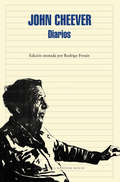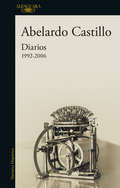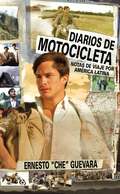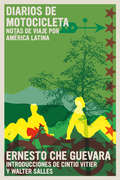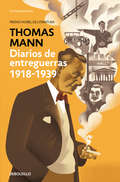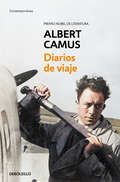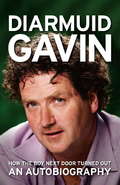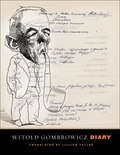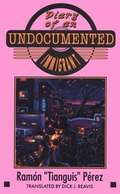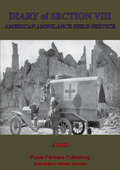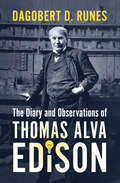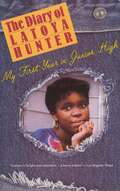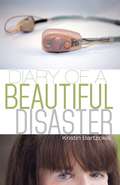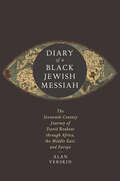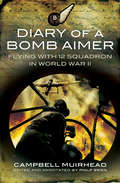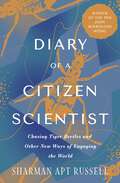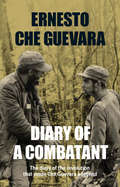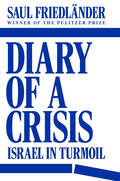- Table View
- List View
Diarios
by John CheeverEstos diarios de un autor fundamental para la literatura norteamericana del siglo XX, son un autorretrato conmovedor del escritor y el hombre, de sus genialidades y sus contradicciones. «Un tesoro. Los dones particulares de Cheever, sitúan sus diarios entre los mejores en su categoría.» The New York Times Book Review John Cheever dejó al morir veintinueve cuadernos de notas y el deseo explícito de que esos diarios, redactados durante más de tres décadas, fueran publicados póstumamente. El autor confió a sus hijos y a su editor la gestión de miles de hojas originariamente escritas sin pensar en su publicación. Estos textos vieron la luz cuando pocos podían imaginar la angustia que corroía al gran autor norteamericano. Incapaz de escribir sin encontrarse a sí mismo en cada línea, sus ambigüedades cruzan cada una de las páginas en las que registró su día a día buscando material para sus ficciones y para encauzar su propia vida. Su candor y sus demonios se conjuran aquí buscando luz, analizando pasos en falso y virajes equivocados, componiendo una cartografía vital que no ahorra descensos a sus infiernos pero que lleva grabada una promesa de salvación. Esta edición cuenta con notas ampliadas y revisadas de Rodrigo Fresán, responsable también de una cronología biográfica del autor. Algunas de las mejores frases de Cheever se encuentran en estos diarios, clara muestra de que retrató su vida con la misma maestría de sus cuentos y novelas. Estos son, sin duda, sus textos más íntimos, los que le acompañaron durante toda una vida luchando por ahogar sus deseos y guardar las apariencias. Una vez publicados, se convirtieron en su redención literaria y en la mejor manera de encontrar ese algo en él que hacía que, a pesar de todo, la vida pareciera un tesoro. Reseñas:«Un itinerario impresionante de un hombre perdido que sesalvaba intermitentemente por un cambio en la dirección del viento o por un destello de amor. No encontrarán un autorretrato más íntimo de un escritor.» Entertainment Weekly «Una introducción provocadora a la mente y el arte de un autor norteamericano clave.» The Boston Globe «Su intención fue no solo hallar evidencia de una vida moral en el caos social, sino también brindarnos la poesía de ese asombroso, estupendo y ensoñador mundo en el que vivimos.»Saul Bellow «Estos diarios contienen los mejores fragmentos jamás escritos por Cheever [...]. La pena, la soledad, los secretos, la vergüenza: él, un impostor en su propia vida, convirtió la aversión que sentía hacia sí mismo en una forma de arte.»The Guardian «Estos diarios son el mayor logro de Cheever, su principal argumento a favor de la supervivencia literaria.» Geoff Dyer
Diarios 1984-1989
by Sándor MáraiDiarios, 1984-1989, primer volumen de los diarios que se traduce al español, nos acerca al Sándor Márai más íntimo y desgarrador, al hombre que, reconciliado con la inminencia de la muerte, pasa revista a sus inquietudes más hondas y esenciales. Celebrado por su inusitado talento para reflejar en sus novelas el esplendor y crepúsculo del humanismo centroeuropeo, y testigo minucioso de los grandes acontecimientos que conmovieron Europa en la primera mitad del siglo pasado, Sándor Márai vio como su obra quedaba relegada al olvido tras abandonar la Hungría comunista en 1948. Después de un azaroso exilio que lo llevó a la ciudad californiana de San Diego, muy lejos de la vieja Europa, pasó sus últimos años en un aislamiento casi absoluto. Privado de su público natural, Márai escribió cinco de los seis tomos de sus diarios en el exilio, el último, redactado entre 1984 y 1989, es un testimonio apasionante y profundamente conmovedor de un hombre decidido a enfrentarse sin ambages con la muerte. Alternando recuerdos personales, instantáneas reveladoras de la vida cotidiana, con comentarios sobre diversos temas de actualidad y apuntes sobre la lectura y la tarea de escribir, el gran autor húngaro -que destaca por la potencia de su palabra y la perfecta lucidez de su mente- se convierte en observador implacable de su propio deterioro físico y narra, sin embellecerlo, el último drama de su existencia: la enfermedad y muerte de su amada esposa, Lola Matzner, con quien durante sesenta y dos años lo había compartido todo. Márai reflexiona sobre el luto y la soledad, cada vez más insoportable, al tiempo que se prepara para el momento final: «Estoy esperando el llamamiento a filas, no me doy prisa, pero tampoco quiero aplazar nada por culpa de mis dudas. Ha llegado la hora.» Escasas semanas después de esta anotación, Sándor Márai se quitaba la vida con un disparo. Reseñas:«Las escuetas y certeras anotaciones se leen con una angustia creciente, con tristeza y respeto.»Die Zeit «Lapidario, preciso, valiente y emocionante.»Neue Zürcher Zeitung
Diarios 1992-2006
by Abelardo CastilloSegundo volumen de los Diarios de Abelardo Castillo, que abarcan el período 1992-2006, etapa consagratoria del autor como uno de los más importantes escritores argentinos del siglo XX. Los diarios personales de Abelardo Castillo publicados por primera vez. Este segundo volumen, que corresponde a los años 1992-2006, abarca la etapa más consagratoria del autor de las novelas El que tiene sed y Crónica de un iniciado, además de ensayos, obras de teatro y cinco volúmenes de cuentos. Castillo fundó y dirigió las legendarias revistas El Escarabajo de Oro, considerada por la crítica especializada como la más prestigiosa publicación literaria de los años sesenta, y El Ornitorrinco, la primera y más importante revista de la resistencia cultural durante los años de la dictadura. Novelista, cuentista, dramaturgo y ensayista, en sus Diarios podemos asomarnos al proceso creador de ideas que se transforman en cuentos o novelas, al maestro de escritores (que concurren a su legendario taller), al observador crítico de la política local e internacional, al pensador, al hombre con sus conflictos personales y, sobre todo, al enorme y fervoroso lector que fue durante toda su vida.
Diarios De Motocicleta
by Ernesto Che GuevaraUn muy joven Ernesto Guevara viaja por América Latina, junto a su amigo Alberto Granado, parten de Argentina y se enfrentan a aventuras y realidades que los transformarán para siempre.Vivido y entretenido diario de viaje del joven Che. Esta edición incluye fotografías inéditas tomado por Ernesto a los 23 años, durante su travesía por sudamérica y es presentada con un tierno prefacio de Aleida Guevara, quien ofrece una perspectiva distinta de su padre, el hombre y el icono de millones de personas."Nuestro film es sobre un hombre joven, el Che, lleno de amor por el continente y buscando su lugar en él." -- Walter Salles, director del película "The Motorcycle Diaries""Si tengo que ser sincera, debo decir que al leer me fui enamorando del muchacho que mi padre había sido." --Prefacio de Aleida Guevara
Diarios de Motocicleta: Notas de viaje por América Latina (The Che Guevara Library)
by Ernesto Che Guevara"Ese vagar sin rumbo por nuestra 'Mayúscula América' me ha cambiado más de lo que creí." --Ernesto Che Guevara, de Diarios de Motocicleta Diarios de Motocicleta es el diario de viaje del Che Guevara, viaje en el que descubre el continente de América Latina mientras es estudiante de medicina, comenzando en 1952 manejando una antigua motocicleta Norton junto a su amigo Alberto Granado, un bioquímico. Captura, se puede argumentar, inigualablemente a cualquier otro libro, la exuberancia y alegría de una persona joven con la firme convicción que la humanidad tiende hacia la justicia, la paz y la felicidad. Después del estreno en 2004 de la estimulante película con el mismo título, dirigida por Walter Salles, el libro se volvió un internacional éxito de ventas, nombrado como tal por el New York Times. Esta edición incluya una introducción de Walter Salles y una variedad de nuevos materiales compuestos para la edición del 2004, coincidiendo con el estreno de la película, incluyendo 24 páginas de imágenes previamente inéditas, fotografiadas por el Che; notas y comentarios de su esposa, Aleida Guevara March; y una exhaustiva introducción del distinguido escritor cubano Cintio Vitier.
Diarios de entreguerras 1918-1939
by Thomas MannLos diarios escritos por Thomas Mann en el periodo de entreguerras acerca de su cotidianidad, su proceso creador y el tiempo convulso que le tocó vivir. Los Diarios de Thomas Mann permiten entrever mundos hoy desaparecidos: el buen hacer de un artista metódico con rutinas y placeres plenamente burgueses; la agitada escena intelectual de principios del siglo XX en Europa, en la que Mann ocupaba un lugar central y en la que reconocía el protagonismo de sus contemporáneos Gide, Kafka, Joyce o Proust; o el laboratorio de un novelista incansable, que trabajaba por acumulación hasta producir obras sólidas como monumentos. Por todo ello, estos Diarios son un libro imprescindible para entender cómo fue este escritor moderno. Pero en lo personal se trasluce también lo político, y aquí aparece un duro testimonio del exilio al que Mann partió con su familia a los sesenta años, en 1933, poco después de la ascensión de Hitler al poder. Ante la caída de su patria en la barbarie, el gran escritor nacional no pudo ni quiso desconectar del sufrimiento de Alemania. No es de sorprender, pues, que en estas páginas dejara reflexiones sobre la historia que se han convertido a su vez en contundentes documentos históricos. La crítica ha dicho:«En sus diarios se entrecruzaba a veces Einstein con divos de Hollywood, con profesores de Princeton o de Harvard abriéndose paso en medio de los obstáculos que encontraba a la hora de escalar otras cimas literarias. Escribir siempre con grandeza al borde del acantilado, entre la belleza y el cieno, entre la estética y la putrefacción era la cumbre que más le atraía.»Manuel Vincent, El País «Los diarios acogen la cotidianeidad del escritor [...] Las páginas del diario de mayor interés sociopolítico son [...] páginas del exilio, inflamadas por la rabia, la tristeza y no exentas de cierta melancolía por la Alemania perdida.»Blas Matamoro
Diarios de viaje
by Albert CamusLas imborrables impresiones que registró Albert Camus en sus viajes por América del Norte y América del Sur durante los años cuarenta Publicado a título póstumo en 1978, Diarios de viaje contiene los apuntes que Albert Camus tomó durante dos periplos por América del Norte y América del Sur en los años cuarenta. Una primera parte describe su estancia en los Estados Unidos y Canadá de marzo a mayo de 1946, mientras que la segunda recoge su paso por el Brasil, la Argentina y Chile entre junio y agosto de 1949. Aunque presentan un interés común, los textos tienen un tono muy distinto. Camus llega a dar conferencias en Estados Unidos como un periodista de la resistencia y autor poco conocido; en Sudamérica, en cambio, desembarca en viaje oficial, como el escritor consagrado por el éxito mundial de La peste. El segundo viaje también le depara los temores vinculados al recrudecimiento de la tuberculosis que lo acosaba desde su juventud. Y en sus páginas queda la marca de una crisis personal de la que nacerán nuevas obras.
Diarmuid Gavin: An Autobiography
by Diarmuid GavinHis work has long been recognised for its innovation and his reputation for clashes with the so-called gardening 'establishment' are famous. He has won many accolades including Silver Gilt at Chelsea Flower Show, however, arguably his biggest achievement was to popularize gardening through the medium of television and move it away from the exclusive and stultifying atmosphere of a private club. This is Diarmuid's characteristically open and honest account of his chaotic, inspired and infuriating (to himself and others) road to success.
Diarmuid Gavin: An Autobiography
by Diarmuid GavinHis work has long been recognised for its innovation and his reputation for clashes with the so-called gardening 'establishment' are famous. He has won many accolades including Silver Gilt at Chelsea Flower Show, however, arguably his biggest achievement was to popularize gardening through the medium of television and move it away from the exclusive and stultifying atmosphere of a private club. This is Diarmuid's characteristically open and honest account of his chaotic, inspired and infuriating (to himself and others) road to success.
Diary
by Lillian ValleeJust before the outbreak of World War II, young Witold Gombrowicz left his home in Poland and set sail for South America. In 1953, still living as an expatriate in Argentina, he began hisDiarywith one of literature's most memorable openings: "Monday Me. Tuesday Me. Wednesday Me. Thursday Me. " Gombrowicz'sDiarygrew to become a vast collection of essays, short notes, polemics, and confessions on myriad subjects ranging from political events to literature to the certainty of death. Not a traditional journal,Diaryis instead the commentary of a brilliant and restless mind. Widely regarded as a masterpiece, this brilliant work compelled Gombrowicz's attention for a decade and a half until he penned his final entry in France, shortly before his death in 1969. Long out of print in English,Diaryis now presented in a convenient single volume featuring a new preface by Rita Gombrowicz, the author's widow and literary executor. This edition also includes ten previously unpublished pages from the 1969 portion of the diary.
Diary
by Richard SelzerSusan Cheever observed in a New York Times Book Review appraisal of his memoir Down from Troy that Richard Selzer "cares more about truth than consequences . . . [and] immerses us in the facts we all know but hate to admit. " Selzer's Diary picks up roughly where the memoir leaves off, as his writing life flourishes and surgical career ends. Stripped of the doctor-writer's "privilege of [walking] about all day in the middle of a short story," Selzer shifts his focus to his interior life. InDiary, the author's successes and regrets, as well as the humor and sadness that surround him, are revealed with the same empathy and vividness that made him one of the great doctor-writers of modern literature. Diary brings together stories and observations dashed off on park benches and in library carrels over the past decade. Following the success of such books as Confessions of a Knife and The Doctor Stories, Selzer's diary entries recount life lived in the shadow of both achievement and disappointment. He introduces a varied cast of characters, from the distinguished fellowship of the "Boys Friendly" to his "fellow loonies," and evokes the streets, buildings, and parks of Yale and New Haven with vibrancy and affection. And throughout, Selzer faces the looming specter of old age. The distinctive voice that paved the way for other notable doctor-writers like Jerome Groopman and Abraham Verghese is revealed here to be no less compelling with the spotlight turned on himself and the drama of everyday living.
Diary Of An Ad Man: The War Years June 1, 1942-December 31, 1943
by James W. YoungAn Advertising Classic from One of Advertising's Greats. On the way to his ranch in New Mexico in the spring of 1942, James Webb Young (1886-1973) stopped in Chicago and over Lunch told George Crain about a book he wanted to write--a history of American business from an advertising man's point of view. Mr. Crain was encouraging and urged Young to begin writing as soon as possible. Advertising Age would publish his account in weekly installments. Beginning the routine of daily notes for such a book, Young found himself handicapped by the lack of historical reference material. As a result, the daily notes began to take on a current flavor; and this led eventually to the Diary as a way to appease Crain's importunities for the promised material. The Diary ran in Advertising Age anonymously because Young felt that would give him more freedom of expression, and involve him in less labor over controversial subjects. It was first printed in book form in 1944. During his lifetime, James Webb Young, senior consultant and a director of the J. Walter Thompson Company, was universally recognized as the dean of American advertising. His concepts, ideas, and experiences continue to shape the profession. Two of his works, How to Become an Advertising Man and A Technique for Producing Ideas, have been especially influential. Mr. Young has an incisive view of human nature, is especially observant and open-minded. Witty, like Mark Twain. Each day in the diary is just one paragrphy of pithy observations.
Diary Of An Undocumented Immigrant
by Dick J. Reavis Ramón Tianguis" PérezThis autobiographical account of survival as a "wetback" or "mojado," affords the reader an unexpurgated look at the United States, its economy and culture from the perspective of the undocumented worker.
Diary Of Section VIII, Of The American Field Ambulance Service
by Anon."As the quick transportation of wounded from the front to the nearest hospital is so great a factor in saving their lives, the American Ambulance Field Service was organized soon after the beginning of the war, and during the subsequent two years its achievement has fully demonstrated the value of its purpose. It has now in the field more than 300 motor ambulances. These are driven by young American volunteers, most of whom are graduates of American universities. To them has been successfully entrusted the vitally important matter of bringing the wounded in the shortest possible time from the trenches to places where the first surgical help can be given. Upon this first surgical help largely depends, naturally, the chance of the wounded surviving long enough to reach the base hospitals. These ambulances are grouped in sections of twenty to thirty cars, and attached to the French Armies. They carry wounded between the front and the Army Hospitals within the Army Zone.The French Army has cited these Sections more than twenty times for distinguished services; has conferred the Croix de Guerre, for bravery, on sixty-six members of the Service, and upon two, the Médaille Militaire, the highest honor for military valor in France."--From the American Ambulance Service Leaflet included in the book.
Diary and Observations of Thomas Alva Edison
by Dagobert D. RunesGain insight into the unique thinking and philosophy of the world&’s most prolific inventor with this collection of his writings.American scientist and businessman Thomas Edison contributed much to the well-being and comfort of our modern life. He gave us the electric light, the phonograph, and the motion-picture camera, along with more than one thousand other inventions. Edison was, as fellow inventor Guglielmo Marconi put it, &“one of the world&’s greatest benefactors.&” In this volume, editor Dagobert D. Runes presents Edison&’s diary along with a selection of his social and philosophical ideas taken from available notes, statements, and observations. Readers will discover that many of Edison&’s casual remarks made decades ago have a definite contemporary significance. His propositions in ethics, philosophy, music, and education show a rare combination of whimsy and deep sincerity.
Diary of Bergen-Belsen, 1944–1945: 1944-1945
by Hanna Lévy-HassA resistance fighter&’s &“remarkable&” memoir of her imprisonment at the infamous Nazi concentration camp (The New Yorker). Hanna Lévy-Hass, a Yugoslavian Jew, emerged a defiant survivor of the Holocaust. Her observations shed new light on the lived experience of Nazi internment during World War II, and she stands alone as the only resistance fighter to report on her own experience inside the camps—doing so with unflinching clarity in dealing with the political and social divisions inside Bergen-Belsen. In this volume, her insightful diary is accompanied by an introduction from her daughter, Amira Hass, an Israeli journalist renowned for her reporting from the West Bank and Gaza. &“A poignant testimonial . . . Hanna Lévy-Hass was clearly a quite extraordinary woman.&”—Tony Judt, Pulitzer Prize finalist and author of Postwar: A History of Europe Since 1945
Diary of Latoya Hunter: My First Year in Junior High
by Latoya HunterLively, poignant, and utterly winning, The Diary of Latoya Hunter is a timely portrait of adolescence--about the universal challenges of youth and about the ways it is shaped by the inner city. It is also a lively introduction to a delightful girl whose humor and idealism are inspirational.From the Trade Paperback edition.
Diary of Samuel Pepys -- Volume 01: Preface and Life
by Samuel PepysRichard Le Gallienne’s elegant abridgment of the Diary captures the essential writings of Samuel Pepys (1633–1703), a remarkable man who witnessed the coronation of Charles II, the Great Plague of 1665, and the Great Fire of 1666. Originally scribbled in a cryptic shorthand, Pepys’s quotidian journal of life in Restoration London provides an astonishingly frank and diverting account of political intrigues; naval, church, and cultural affairs; and the sexual escapades and domestic strife of a man with a voracious, childlike appetite for living. “As a human document the Diary is literally unique,” notes Le Gallienne. “It will have a still greater value for its historical importance.”
Diary of a 'dotty dog' Doctor
by John Fisher Sarah WhiteheadFrom aggressive GSDs to what we can learn from our own dogs, John Fisher introduces in these journal entries experiences and lessons he has learned from the dogs.
Diary of a Beautiful Disaster
by Kristin BartzokisFeatures 8-page photo insert!“I highly recommend ‘Diary of a Beautiful Disaster’ as a journey through what it means to be a completely, and unflinchingly, beautiful human being.” - David Roche, humorist and author, “The Church of 80% Sincerity”She had just scored a perfect ten on her floor exercise routine, but Kristin Bartzokis stood stoically before the screaming crowd.For Kristin, this moment of perfection was something she always knew she could achieve. She’d been raised to live without limitations, and she’d adopted a determination to stay strong and unemotional, no matter what.Born with Treacher Collins Syndrome, a facial abnormality, Kristin learned at an early age the importance of strength–strength when confronted with multiple surgeries, strength when confronted with stares and questions, and strength when confronted with the constant knowledge that you will never look, or be, like everyone else.Kristin Bartzokis’ life story is one of achievement and inspiration, an example of an unbreakable spirit and unwavering fortitude. No matter what life has thrown at Kristin, she has turned challenges into triumphs and used obstacles as stepping stones.Diary of a Beautiful Disaster empowers readers to embrace their own uniqueness and boldly go forth into the world being exactly who they are. Kristin reminds us that although life can be complicated and messy, it is always, above all, beautiful.“ ‘Diary of a Beautiful Disaster’ is a moving memoir, but more than that it is an honest, sincere front-row peek into one woman’s ability to persevere, overcome, and find true acceptance.” – Erica Mossholder, executive director, Children’s Craniofacial Association
Diary of a Black Jewish Messiah: The Sixteenth-Century Journey of David Reubeni through Africa, the Middle East, and Europe (Stanford Studies in Jewish History and Culture)
by Alan VerskinIn 1524, a man named David Reubeni appeared in Venice, claiming to be the ambassador of a powerful Jewish kingdom deep in the heart of Arabia. In this era of fierce rivalry between great powers, voyages of fantastic discovery, and brutal conquest of new lands, people throughout the Mediterranean saw the signs of an impending apocalypse and envisioned a coming war that would end with a decisive Christian or Islamic victory. With his army of hardy desert warriors from lost Israelite tribes, Reubeni pledged to deliver the Jews to the Holy Land by force and restore their pride and autonomy. He would spend a decade shuttling between European rulers in Italy, Portugal, Spain, and France, seeking weaponry in exchange for the support of his hitherto unknown but mighty Jewish kingdom. Many, however, believed him to favor the relatively tolerant Ottomans over the persecutorial Christian regimes. Reubeni was hailed as a messiah by many wealthy Jews and Iberia's oppressed conversos, but his grand ambitions were halted in Regensburg when the Holy Roman Emperor, Charles V, turned him over to the Inquisition and, in 1538, he was likely burned at the stake. Diary of a Black Jewish Messiah is the first English translation of Reubeni's Hebrew-language diary, detailing his travels and personal travails. Written in a Hebrew drawn from everyday speech, entirely unlike other literary works of the period, Reubeni's diary reveals both the dramatic desperation of Renaissance Jewish communities and the struggles of the diplomat, trickster, and dreamer who wanted to save them.
Diary of a Bomb Aimer: Flying with 12 Squadron in World War II
by Campbell MuirheadCampbell Muirhead kept a meticulous diary of his wartime RAF service from the day that he set forth to train as a pilot in Canada and the USA in 1942 to the end of his wartime service with 12 Squadron Bomber Command. He was unable to pass the flying course and decided to retrain as a bomber because he wished to become operational as soon as possible. The book is particularly emotive as he wrote in the common parlance of those wartime days and truly reflects the emotions, fears and feelings of those caught up in that mighty conflict. His diligent observations of life in the RAF from joining-up, crossing the Atlantic, training in the New World bring back wartime life as it really was. His descriptions of the perils of flying on bombing raids deep into the heart of Germany truly reflect the many different aspects of life in a front-line squadron in a way that can only be told by one who was there.
Diary of a Citizen Scientist: Chasing Tiger Beetles and Other New Ways of Engaging the World
by Sharman Apt RussellA critically acclaimed nature writer explores the citizen scientist movement through the lens of entomological field research in the American Southwest. Award-winning nature writer Sharman Apt Russell felt pressed by the current environmental crisis to pick up her pen yet again. Encouraged by the phenomenon of citizen science, she decided to turn her attention to the Western red-bellied tiger beetle, an insect found widely around the world and near her home in the Gila River Valley of New Mexico. In a lyrical, often humorous voice, Russell shares her journey across a wild, rural landscape tracking this little-known species, an insect she calls &“charismatic,&” &“elegant,&” and &“fierce.&” What she finds is renewed optimism in mysteries still left to be explored, that despite the challenges of climate change, there is a growing diversity of ways ordinary people can contribute to the research needs of scientists today in the name of environmental activism. Offering readers a glimpse into the pioneering field of citizen science, Diary of a Citizen Scientist documents one woman&’s transformation from a feeling of powerlessness to engaged hopefulness.Winner of the John Burroughs Medal and the WILLA Literary Award for Best Creative NonfictionNamed one of the top ten best nature books of 2014 by GrrlScientist in The Guardian
Diary of a Combatant
by Ernesto Che GuevaraThe publication of this title by Ocean Sur in Spanish in July 2011 provoked considerable international attention (including CNN). This never-before-published diary (comprising a dozen small notebooks) Ernesto Che Guevara kept during the guerrilla war in Cuba when he joined the struggle to overthrow the Batista dictatorship that led to the 1959 revolution has now been meticulously transcribed by his widow, Aleida March.Why did it take over fifty years for this diary to be published? Maybe because of some caustic comments Che makes in his usual brutally frank style. Maybe it was felt appropriate to wait until Fidel Castro had produced his own memoirs (now published by Ocean Press as The Strategic Victory).In launching the book in Havana in July 2011, editor Maria del Carmen Ariet marked that it was "never clear whether or not Che wanted these diaries published" as he had reworked several pieces into his famous Reminiscences of the Cuban Revolutionary War, on which Steven Soderbergh based part one of his epic movie Che, starring Benicio Del Toro.Nevertheless, all Che's diaries-from his early Motorcycle Diaries and its sequel, Latin America Diaries, through to his last diary from Bolivia-are extraordinary examples of his literary gift and his political incisiveness, in terms of his personal reflections, his criticisms and self-criticism, and his observations about others and events.Other features of this new book are fifty-eight unpublished photos from Che's personal archive and unpublished letters (including correspondence between Che and Fidel), an index, and extensive glossary.
Diary of a Crisis: Israel in Turmoil
by Saul FriedländerSearching reflections on the crisis in Israel and Gaza by a Pulitzer Prize-winning historian of the HolocaustDiary of a Crisis explores the past tumultuous and traumatic year in Israel-Palestine. The eminent historian Saul Friedländer began a diary of Israeli politics in January 2023 as the country was convulsed by protests against Netanyahu&’s attempt to overhaul the judiciary. Hundreds of thousands took to the streets to demonstrate against this threat to democracy. But the protests said nothing about the Palestinian question—the "elephant in the room," according to Friedländer, who resumed his diary after Hamas&’s 7 October assault on southern Israel. Israel was facing one of the worst crises in its history, he observes, under the worst possible internal conditions.Friedländer weaves together profound reflections on a national history in which he has been an active participant. He describes how Prime Minister Golda Meir once flatly declared to him, "There is no Palestinian people." For Friedländer, on the other hand, the fight for democracy is inseparable from equality of treatment for Arab and Jewish citizens and an end to Israeli domination over Palestinians in the Occupied Territories. He argues that despite the continuing bloodshed, a two-state solution remains the only long-term answer to this most intractable of conflicts.
